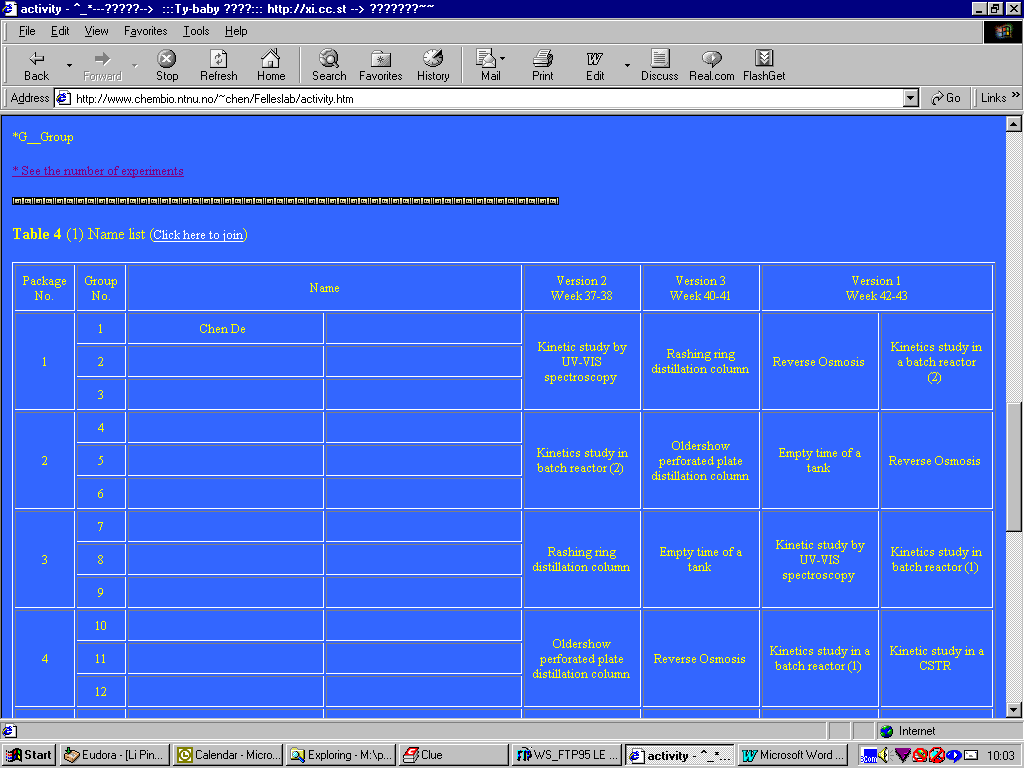
Felleslab for SIK 2010 and SIK2015
Frequent Q&A
Main page | Objective | Exercises | Plan | Supervisor | Report | Date | Lab watch | Evaluation | Q&A
|
|
|
Felleslab for SIK 2010 and SIK2015 |
|
Frequent Q&A Main page | Objective | Exercises | Plan | Supervisor | Report | Date | Lab watch | Evaluation | Q&A |
1.
Who should participate the lab course?The students who take the course SIK 2010 (Separation Technology) or SIK 2015 (Reaction Engineering) must participate and pass the lab course.
2. How do I register lab course or sign lab group?
You should submit your registration of lab group via internet. In the page of activity plan you can find Table 4 (1)(2)(3) Name list, you can click "click here to join"

3.
How do I select package?
If you take only course SIK 2015, you can select one package between
package 10-11 and package 5. In package 5, exercise of pressure drop is for version 1 instead of version 2.If you take only course SIK 2010, you can select package 12.
4. What should I do before starting experiments?
a. Read
b. Contact with supervisor and pick up the information materials for the exercises, including front cover of the report, exercise text, chemical card.
c. Make an appointment for your exercise-lab-time
d. Literature search
e. Make a plan for your exercises
f. Fill out the chemical card (only health dangerous chemicals of reactants, not for products due to their low concentration) and apparatus card.
g. Group will have a long discussion with supervisor about your plan. During this discussion, Group should decide the experimental conditions, analysis methods, calculation methods…. If the supervisor is satisfied, the experiments can be started.
Before you get permission from the supervisor, please do not start experiments!!!!!.
5. What should I keep in mind during experiments?
a. Always consider safety
b. Keep experimental place clean
c. Do experiments following the plan
d. Record all the experimental observations carefully
e. Follow all the regulations and instructions stated in the HMS-hefte.
f. Using waste-container for waste chemicals
6. What should I do after experiments?
a. Keep experimental place clean
b. Close the electricity, gas and water, if you are asked.
c. Treat experimental data and estimate uncertainty of the experiments
d. Prepare reports
e. Deliver the report in time
f. Give a message to supervisor if you want him/her to read through your report 1.
7. When can I do experiments?
The lab-time is 8:00-19:00 from Monday to Thursday during lab week.
The lab time is normally fixed.You should discuss with your supervisor, and make an appointment for your lab time. If you need to do some additional experiments on Friday, you must make an appointment.
8. Whom can I get help from?
If you have any question about registration and general plan, you can ask De Chen (KV-407, 93149, chen@chembio.ntnu.no) or Øye Aspbjørn, Tel: 94018, K4-118, e-mail: asbjorn.oye@chembio.ntnu.no.
If you have questions concerning experimental plan, time, report or you might meet problem during experiments, you can ask the help from your supervisors during 8:00-15:30. During 15:30-19:00 you must call the help of Lab-Watch. The list of Lab-Watch can be found on the door of each lab.
In addition, Fossen Arne (KV-019, 94143) are ready to help you for glass equipment, chemicals. Brun Harry (K5-341, 94144), Sundseth Frode (K5-033) will help you for electronic equipment and gas.
8. Where should I do experiments?
|
No. |
Lab exercises |
Room |
Supervisors |
Room |
Tele. |
|
1 |
Kinetic study in a batch reactor (1) |
K5-3etg |
Storsæter Sølvi |
K5-406 |
94155 |
|
2 |
Kinetic study in a CSTR |
K5-3etg. |
Bjørgum Erlend |
KH-105 |
94156 |
|
3 |
Kinetic study by UV-VIS spectroscopy |
K5-4etg. |
Yu Zhixin |
K5-340 |
94161 |
|
4 |
Kinetic study in a batch reactor (2) |
K5-3etg. |
Hauge Kjetil |
K5-406 |
93147 |
|
5 |
Rashing ring distillation column |
K4-301 |
Storkaas Espen /Alstad Vidar |
K4-225B |
93691 |
|
6 |
Oldershow perforated plate distillation column |
K4-301 |
Skouras Stathis |
K4-220 |
95728 |
|
7 |
Distillation in hole plate column |
K4-301 |
Storkaas Espen |
K4-225B |
93691 |
|
8 |
Reverse Osmosis/ultrafiltration |
K5-1etg. |
Theilin Willy |
K4-210 |
94126 |
|
9 |
Empty time of a tank |
K4-301 |
Nguyen N Tu |
K5-443 |
51128 |
|
10 |
Heat exchanger |
K4-301 |
Silva Erik Falck Da |
K5-145 |
94125 |
|
11 |
Pressure drop |
K4-301 |
Håvard Linborg |
K5-247 |
94114 |
9. Where can I get another part of experimental results when I prepare report for version 3 of experiment?
This course is designed to train you in good teamwork. The experiment work is divided into two parts and two groups work together on one exercise. The report of version 3 experiment is required to include all experimental data from both groups. You can get another part of experimental results (version 2) from your supervisor. The discussion between two groups is highly encouraged.
11. What should I do after I finish the report?
Please deliver the report in time (see detailed deadline). Discussions with supervisor are encouraged. Corrections of your report should be done if you are asked by your supervisor.
![]()